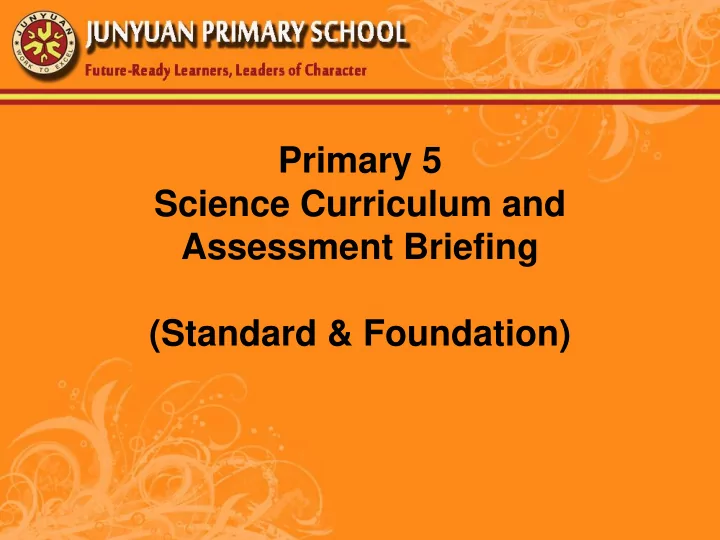

Primary 5 Science Curriculum and Assessment Briefing (Standard & Foundation)
Content A. Coverage of Topics and Concepts B. Assessment - Knowledge-type and Application-type Questions C. Strategies to Support our Pupils
A. Topics and Concepts Reference: https://www.moe.gov.sg/docs/default-source/document/education/syllabuses/sciences/files/science-primary-2014.pdf
A. Topics and Concepts • Thematic Approach 5 themes: Diversity, Cycles, Systems, Energy and Interactions (over the span of 2 years) Appreciate the links between different themes / topics to allow the integration of scientific ideas. • Spiral approach Same theme is revisited at the upper block. More advanced concepts and skills are built on basic ones learnt at the lower block.
Science Skills and Processes Skills Processes Observing Creative problem Comparing solving Classifying Decision-making Using apparatus and equipment Investigation Communicating Inferring Formulating hypothesis Predicting Analysing Generating possibilities Evaluating
Sequence of Science Topics 2020 (Standard) Primary Term 1 Term 2 • The Unit of Life • Water and Changes of 5 • Reproduction in Humans State • Reproduction in Plants • Water Cycle Term 3 Term 4 • Plant Transport System • Electrical Systems • Air and the Respiratory • Using Electricity • Energy in Food (not system • The Circulatory System tested in SA2)
Sequence of Science Topics 2020 (Foundation) Primary Term 1 Term 2 • Reproduction in Humans • Air and the Respiratory 5 • Reproduction in Plants system (cont) • Plant Transport System • The Circulatory System • Air and the Respiratory • Water and Changes of system State • Water Cycle Term 3 Term 4 • Electrical Systems • Energy in Food • Using Electricity
2014 Science (Primary) Syllabus For more details, visit the link : • https://moe.gov.sg/education/syllabuses/sciences
B. Science Assessment Assess understanding of core concepts Weighted Assessments End of Year Assessment Booklet A: MCQ Booklet B: Open-ended
Assessment Overview (Standard Science) Term 2 Term 3 Term 4 Weighted Weighted End of Year Assessment Assessment Examination Total Marks 30 30 100 Duration 45 min 45 min 1 h 45 min Weighting 30% 30% 70%
Assessment Overview (Foundation Science) Term 2 Term 3 Term 4 Weighted Weighted End of Year Assessment Assessment Examination Total Marks 30 30 70 Duration 45 min 45 min 1 h 15 min Weighting 30% 30% 70%
B. Weighted Assessment Format of Weighted Assessment (Standard) Duration of paper: 45 minutes Booklet Item Type Number of Marks Questions allocated A Multiple Choice 14 14m B Open-ended 4 -5 16m Total 18 - 19 30m
B. Weighted Assessment Format of Weighted Assessment (Foundation) Duration of paper: 45 minutes Booklet Item Type Number of Marks Questions allocated A Multiple Choice 14 14m B Structured & 6 16m Open-ended Total 20 30m
B. Semestral Assessment Format of End of Year Examination (Standard) Duration of paper: 1 hour 45 minutes Booklet Item Type Number of Marks Weighting Questions allocated (%) A Multiple Choice 28 2m 56 B Open-ended 12 - 13 2 - 5m 44 Total 40 - 41 - 100
B. Semestral Assessment Format of End of Year Examination (Foundation) Duration of paper: 1 hour 15 minutes Booklet Item Type Number of Marks Weighting Questions allocated (%) A Multiple Choice 18 2m 36 B Structured 6 - 7 2 – 3m 14 Open-ended 5 - 6 2 - 4m 20 Total 29 - 31 - 70
Examination Dates Weighted Term 2 Assessment 1 Weighted Term 3 Assessment 2 End of Year Term 4 Examination All exam dates will be announced in the school bulletin
B. Assessment Features of the Paper • There are different question types: Knowledge and Application Type Questions Pupils will be able to apply facts / concepts to new situations and use one or a combination of basic process skills. Familiarity with the terms used in the question stems will benefit pupils: Spend less time writing unnecessary information (correct facts but not answering to the point, marks are not awarded)
B. Assessment Knowledge (K) and Application (A) Type Questions K (How it looks like) A (How it looks like) o Name the gas inside the o Explain why there was a test tube… decrease… o Write down the stages o Suggest two benefits … of the life cycle… o What can be concluded o State the process … from the results… o How did this make it fair… It is still required of pupils to Pupils need to explain in detail when recall basic facts / terms / names expressing their answers. (of key processes*) as this accounts for some portion of the paper.
C. Supporting our Pupils • Accurate understanding of concepts is important - MAKE CONNECTIONS between concepts learnt - APPLY concept(s) in new situations - EXPLAIN clearly, completely and accurately referencing to science concepts/ facts • Revision of concepts learnt from P3 to P6. Home support from parents/ guardians is important. • Practice - Important to practise the array of thinking skills (e.g. creative problem solving, decision making & investigation skills) that support scientific inquiry
C. Supporting our Pupils
Recommend
More recommend